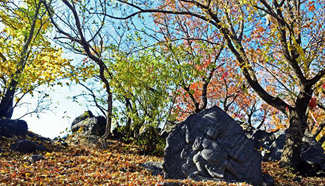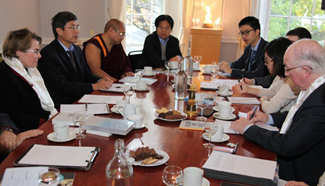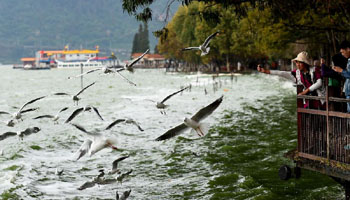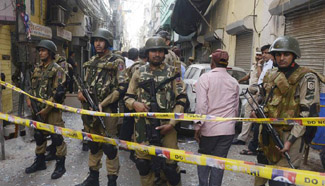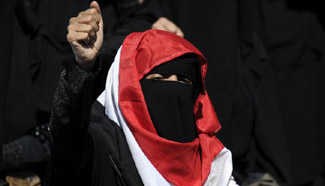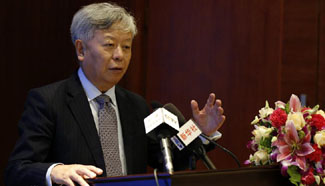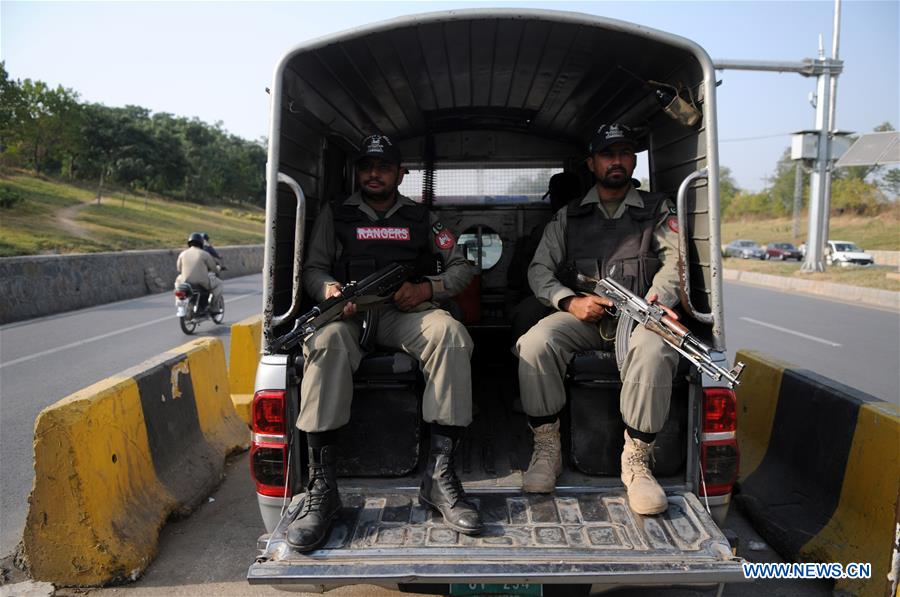
Pakistani rangers patrol on road due to security high alert following an attack at a police training center in Quetta, in Islamabad, capital of Pakistan, Oct. 25, 2016. (Xinhua/Ahmad Kamal)
by Muhammad Tahir
ISLAMABAD, Oct. 25 (Xinhua) -- A deadly attack on a police training center in the southwestern Pakistani city of Quetta that killed 60 policemen and injured 117 others has raised concern about the presence of the terrorist groups despite the success of the country's efforts to eliminate terrorist networks.
A breakaway faction of the Pakistani Taliban and the Islamic State (IS), or Daesh, both claimed they were behind the carnage. Officials in Balochistan of which Quetta is the capital blamed the banned sectarian group, "Lashkar-e-Jhangvi" for the brutal attack. IS also released photographs of the alleged attackers through its Amaq news agency.
Chief of the paramilitary Frontier Corps, Major General Sher Afgun, said the attackers were "receiving instructions" from their handlers in the neighboring Afghanistan.
Although there is substantial decrease in terrorist acts in Pakistan as the result of military operations in the country's tribal regions, the Quetta attack shows the armed groups still have some hideouts where they plan and execute attacks.
The groups, which had previously operated from the Pakistani tribal regions, have been deprived of their hideouts and the security officials here believe most of the militants have now shifted their centers to Afghanistan and operate from there.
Security officials also believe that some of the fleeing militants have taken shelter in urban areas, who are now the target of the intelligence-based and combing operations. The attack in Quetta suggested that the armed groups have now focused the cities, which is still a challenge for the security agencies.
The military with the help of civilian intelligence agencies and the police is now chasing the facilitators and financiers of the terrorists who are now hiding in densely populated areas.
They have managed to arrest many suspects, but the terrorists still have some sort of system to strike in parts of the country.
Pakistani officials insist that the presence of the Pakistani Taliban groups in Afghanistan has now emerged as major challenge for the security forces.
Hours after the paramilitary forces chief in Balochistan said the terrorists were being handled from Afghanistan, the Interior Minister Chaudhry Nisar Ali Khan also claimed that the terrorists were operating from across the Afghan side of the border.
He admitted that the enemy is weakened but not completely eliminated which means Pakistan still faced security problems.
Defense experts say that the proscribed organizations opt for such attacks to get its recognition and get more money and support from the foreign hostile agencies.
Syed Nazir Mohmand, a retired Pakistan army brigadier, is of the view that with the major terrorist attacks like in Quetta, the banned terrorist groups try to present themselves as "mercenaries" available for any terrorist attack.
"There are mercenaries like the Tehrik-e-Taliban Pakistan, Lashkar-e-Jhangvi, Lashkar-e-Islam and the TTP Jamaat ul Ahrar. They are carrying out terrorist activities to invite attention of those foreign forces who want to destabilize Pakistan," Mohmand told Xinhua on Tuesday.
He also viewed "security lapse" in the attack, saying that as the terrorism threat still persists, the law enforcement agencies should have to further improve their monitoring system especially in Balochistan.





